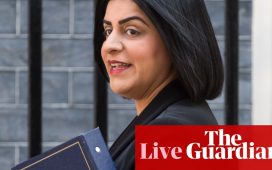The UK has offered qualified support for the creation of a special tribunal capable of holding the Russian civilian and military leadership, including Vladimir Putin, to account for war crimes in Ukraine.
The British government said it had been invited by Ukraine to join a group of international partners pursing a mechanism for accountability, and encouraged other G7 countries to also take part.
The UK government has until now been resisting the tribunal proposal because legal advisers fear it would undermine the existing international criminal court and its chief prosecutor, Karim Khan KC, who is a British citizen.
The campaign for a specialised court has been led by the British barrister Philippe Sands KC, the former Labour prime minister Gordon Brown and the Ukrainian government itself.
The European parliament backed the plan this week as did the German foreign minister, Aannalena Baerbock, during her visit to The Hague, the site of the ICC.
Khan has argued against the special tribunal, saying it would duplicate the ICC’s work. Advocates argue that a Nuremberg-style tribunal is necessary to address the specific crime of aggression, and so open a clear route for the Russian leadership to be prosecuted rather than ordinary soldiers.
The UK’s support for a special tribunal was qualified in that the government said it would support a special hybrid court so long as it did not duplicate the ICC’s work. It added that the tribunal should be based on Ukrainian national justice, but contain international elements.
The British foreign secretary, James Cleverly, said: “Russia’s war crimes must not go unpunished. That is why Britain has accepted Ukraine’s invitation to join this coalition bringing our legal expertise to the table to explore options to ensure Russia’s leaders are held to account.”
The Foreign Office said: “An investigation into the crime of aggression could complement established mechanisms for investigating war crimes, including the international criminal court and Ukraine’s domestic legal process. Together these parallel processes would help ensure all crimes are fully investigated and that perpetrators are held to account.”
The Foreign Office acknowledged that the ICC did not have jurisdiction over crimes of aggression allegedly committed in and against Ukraine, but stressed the details of the proposal would matter and that the UK was willing to explore a “hybrid” tribunal, ie, a specialised court integrated into Ukrainain justice system with international elements.
Andriy Yermak, a senior Ukraine government adviser, said at an event at the World Economic Forum in Davos: “We need to create a special international tribunal to punish Russia’s top political leadership that is guilty of the crime of aggression. Ukraine, jointly with partner states, is doing everything possible to reach this goal.”
Speaking at the same event, Geoffrey Nice KC, the lead prosecutor at the trial of Slobodan Milošević, said: “I firmly believe that whatever is done in terms of accountability should be done by Ukrainians, in Ukraine and in Ukrainian and Russian languages– not English. Not by internationals, they can advise, but don’t let them run it.”
Nice said this would help Ukraine avoid potential international pressure on taking any decisions related to these trials, and also that investigating crimes committed on Ukrainian soil was the country’s privilege and duty.










